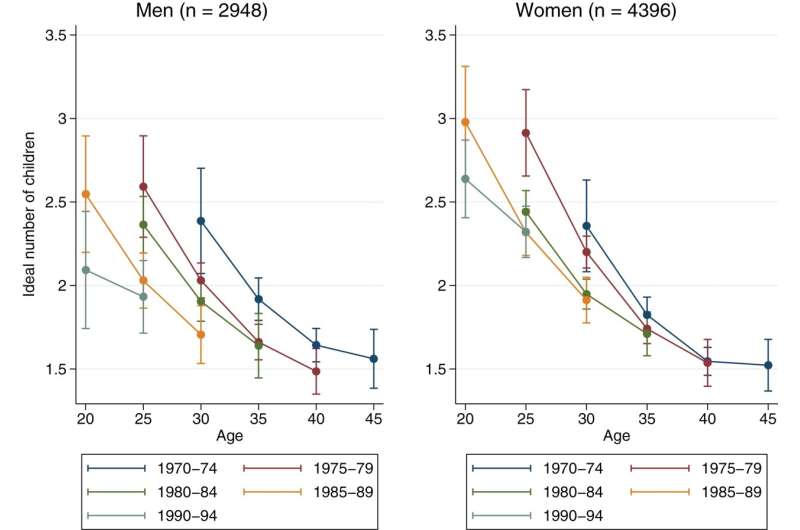This article has been reviewed according to Science X's editorial process and policies. Editors have highlighted the following attributes while ensuring the content's credibility:
fact-checked
trusted source
proofread
Declining fertility ideals? Young people more often prefer having no children

Fertility has declined in high-income countries over the last decade, but has the number of children people wish to have also declined? A recent study shows that the ideal number of children has decreased across birth cohorts, especially among people born in 1985–1994.
Drawing on repeated representative surveys collected between 2007 and 2018 by Väestöliitto, the Family Federation of Finland, the study included men and women aged 20 to 45 from five birth cohorts: 1970–1974, 1975–1979, 1980–1984, 1985–1989, and 1990–1994. Participants reported their personal ideal number of children—the number of children they wish to have. This was compared across birth cohorts at the same age (e.g., responses from 30-year-olds in the 1970–1974 birth cohort were compared to the responses from 30-year-olds from more recent birth cohorts).
Declining ideal number of children and the spread of child-free ideals
"The primary finding was that people from more recent birth cohorts had a lower ideal number of children compared to people from earlier cohorts," Kateryna Golovina from the Helsinki Collegium for Advanced Studies states.
This decline in the ideal number of children was driven by the spread of child-free ideals among childless people born after 1985. To illustrate, 25% and 26% of men aged 25 and born in 1985–1989 and 1990–1994, respectively, stated that their ideal number of children was zero, in contrast to 4% and 5% of men aged 25 and born in 1975–1979 and 1980–1984, respectively. The corresponding percentages for women were 22% and 21% compared to 2% and 9%.
Socioeconomic factors play a minor role
The study also examined whether the decline in the ideal number of children might be linked to the increased economic uncertainty associated with the economic crisis in 2008.
"Although some associations were found between education, income, and employment status and the ideal number of children, the differences in the ideal number of children across birth cohorts remained highly significant," Golovina says.
This suggests that a more profound cultural change underlies the decline in fertility ideals, rather than a temporary change due to the 2008 economic crisis.
Attitudes towards childbearing have changed in Finland
Overall, the study results indicate that attitudes toward childbearing and family life have changed in Finland. Although not directly examined, broader cultural changes within society might be behind such a sharp increase in child-free ideals. This, in turn, might be one of the causes driving the decline in actual birth rates in Finland.
"Modern life has changed traditional life paths in which having children has been a given. Freedom of choice can increase conscious decisions of childlessness but also uncertainty about parenthood," says Markus Jokela, professor of psychology who was one of the authors.
According to Golovina further studies should investigate whether similar shifts in fertility ideals are occurring in other countries and explore the underlying reasons for these changes.
More information: Kateryna Golovina et al, Birth cohort changes in fertility ideals: evidence from repeated cross-sectional surveys in Finland, European Sociological Review (2023). DOI: 10.1093/esr/jcad048
Provided by University of Helsinki





















